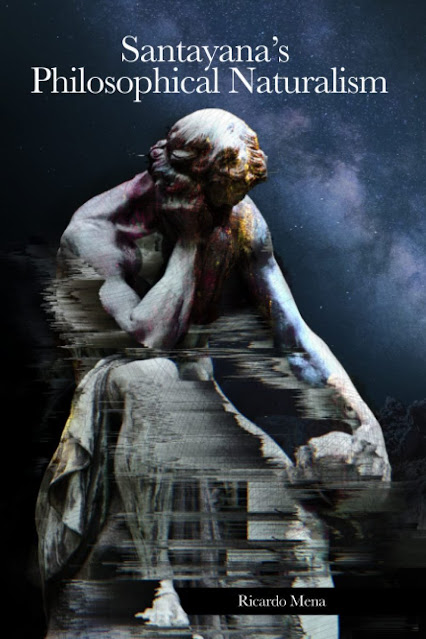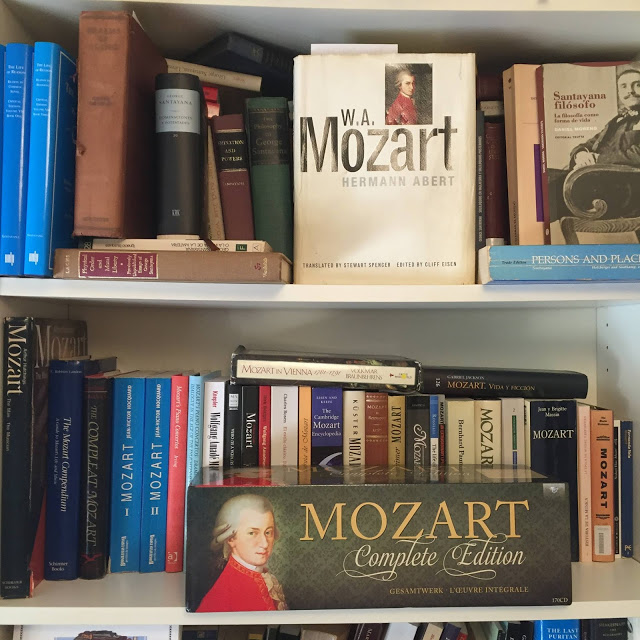SPN §2
 |
Key Ideas
—Renunciation as election of finitude (Paragraph 1).
—Happiness is being you doing what you love doing (Paragraph 1 & 2).
—To choose being happy in this life is a rebellion
against conventions (Paragraph. 2).
—Nora and Mother Courage (Paragraph 3).
—Spirituality as joy in observing essences (Paragraph 4).
The second thought reads like this:
§2 If our feeling of what naturally should be differs
from our sense of what actually is, it is only because
we live in an age of transition; the mind has emigrated,
but the heart has remained in the “old country.”
In here I added a footnote, which reads:
The transition means that nature is all, and there is nothing
beyond her, but one cannot love her, because nature is amoral,
pure force. What is going to be our religion, then? That is the
deep anxiety of the transition of our modern, democratic civilisation.
Santayana will offer his personal choice: devote your
mind to the detached contemplation of essences, and that will
be natural spirituality, a lay religion of universal scope. Anyone
having a mind can learn to enjoy this spirituality, while
remaining a naturalist. The impulse of Santayana’s philosophy
is to find eternal meaning in our transitory lives, to build
from matter a joyful spirituality.
Thought §2 goes on:
Lotze’s philosophy is an admirable expression of this
state of things; his solution is ingenious and suggestive
in many ways, and has its reality and importance
for us now. Only it lacks the radical quality of
nature’s own slow but inevitable solution. This solution,
Goethe tells us, is renunciation—a renunciation,
however, that is not pure loss, but the condition of
the only possible and permanent gain.
Again, a footnote at the end:
This renunciation as a condition of our gain lies in seeing
what is beyond our sphere and ceasing to desire it except as
an object of contemplation. Cf. §199.
1. Let’s see what else can be said of §2. Renunciation is an important idea in Santayana. I mean, it is not only important, it is key for happiness, according to Santayana’s idea of happiness. You cannot be everything, so you are supposed to be something. That is all there is to happiness: be something, be something specific that you value for your own self, for your own pleasure, for your own peace of mind. In Santayana, pleasure is not going to a sunny beach to copulate with a bunch of girls, while smoking pot and drinking beer. It is something more Epicurean—Aristotelian: practice an action to create the habit that you find beneficial for your own perfection: learn to do something you love doing, a vocational activity that gives you meaning. You have the potential to be the full human being that you are, so remember that being you is something unique and no one has the right to tell you what to do to be happy; no one has the right to tell you how to live.
2. Of course, it is easier said than done. Who are you? What do you find meaningful in your life? What job is going to be your vocation? Homo sapiens is not made by DNA to be happy, as Santayana recognises in a later thought selected in SPN. Happiness is a right, but from the biological perspective of life, it is a luxury. You need to have your needs covered, and you need to believe in the right to be happy in this life. To be happy in this life, one needs to reject the faith in being eternally happy in a beyond. It is something that demands courage and rebellion against society’s conventions, as we see in Ibsen’s A Doll House.
3. Nora renounces being the wife of Torbald. She wants to be an individual first, she has the courage to be Nora, a woman, first of all. The debate about the unbelievable fact that Nora abandons her children is a futile argument. Ibsen makes the point better by underlying the unbelievable revolution of his point: not even biology is going to determine that Nora remains in the dungeon with the patriarch. This 8th of March was International Women’s Day. And Nora could be her saint, although Nora stands for us all, women and men. She is the Patron Saint of Courage. Mother Courage, created by Bertolt Brecht, is the opposite. She is the Saint of Conformity.
4. Santayana’s philosophy stands for peace of mind, perfection in finitude, wisdom understood as knowing your limits, what you are not. Spirituality, in Santayanian terms, means joy in seeing, in observing, in feeling. Being is what essence is all about. Existence is subject to decay, to death, so why not love what does not exist, what is being, the essences your mind sees and feels? It takes time to learn that the possessive instinct is the evil in this world. William Blake knew it perfectly well when he said that eternity lie in seeing beauty fly you by, without trying to fetter it, to enslave it, to possess it. Music is an art that seems very well attuned to this way of seeing what Santayanian spirituality means.
On and on till the final Dragon...


Comments
Post a Comment